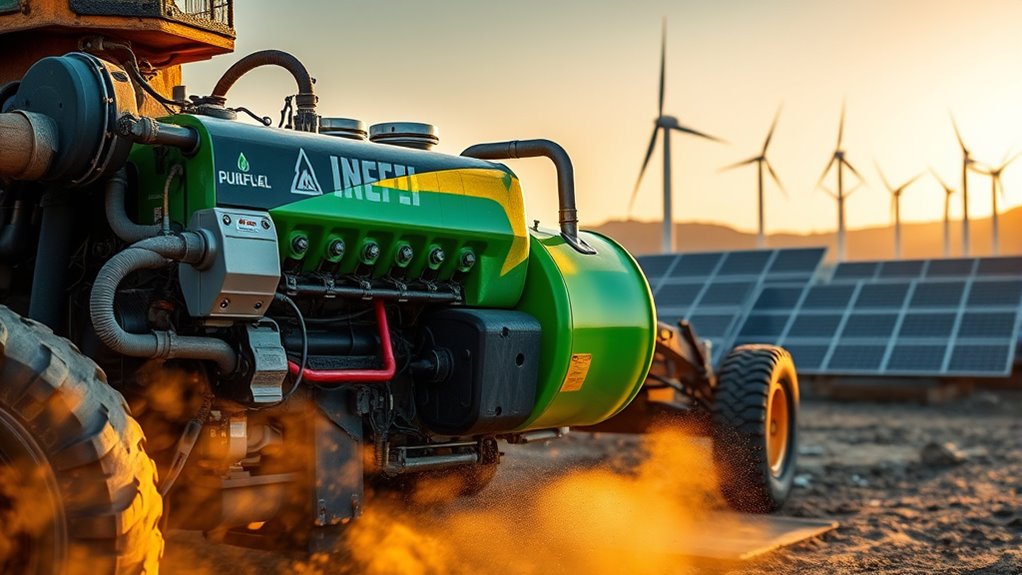Switching to sustainable fuels for off-road engines can considerably cut emissions and reduce environmental impact. Options like biodiesel, made from renewable resources, burn cleaner and are compatible with existing engines. Renewable diesel offers even greater emissions benefits, while electric power and hydrogen fuel cells provide zero-emission solutions. Although infrastructure challenges exist, adopting these options can boost efficiency and long-term savings. If you explore further, you’ll discover how these technologies can transform your off-road operations.
Key Takeaways
- Biodiesel made from renewable resources like vegetable oils and animal fats is compatible with existing diesel engines and reduces pollutants.
- Renewable diesel significantly lowers greenhouse gas emissions and can often be used without engine modifications.
- Electric power offers zero-emission operation for off-road equipment, with benefits including lower costs and quieter performance.
- Hydrogen fuel cells produce only water vapor, eliminating NOx, particulate matter, and CO emissions, suitable with optimized storage and maintenance.
- Infrastructure development and supply chain improvements are essential to support widespread adoption of green fuels like biofuels and hydrogen.
Biodiesel: A Renewable Alternative for Off-Road Machinery
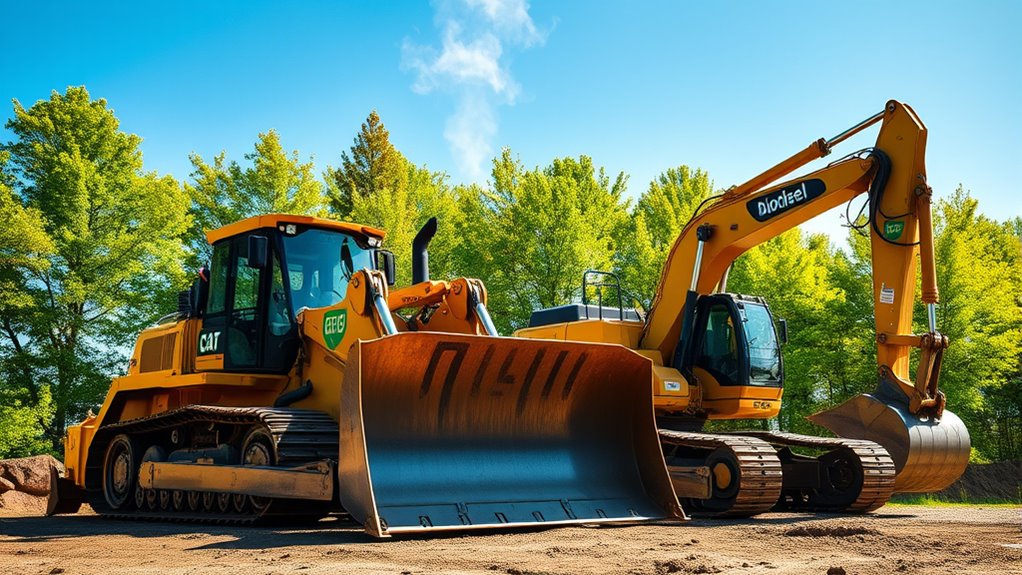
Biodiesel has gained recognition as a viable renewable fuel option for off-road machinery because it can substantially reduce greenhouse gas emissions compared to traditional diesel. When you switch to biodiesel, you’re using a fuel made from renewable resources like vegetable oils or animal fats, which helps lower your carbon footprint. Biodiesel is compatible with existing diesel engines, so you can often use it without extensive modifications. It burns cleaner, producing fewer pollutants like particulate matter and carbon monoxide, which benefits both the environment and your equipment’s longevity. Plus, biodiesel is biodegradable and non-toxic, making spills less harmful. Additionally, biodiesel contains renewable resources that can be sustainably sourced, further enhancing its environmental benefits. By choosing biodiesel, you’re taking a step toward more sustainable operations, reducing reliance on fossil fuels, and helping combat climate change.
Renewable Diesel: Cleaner Fuel for Heavy Equipment
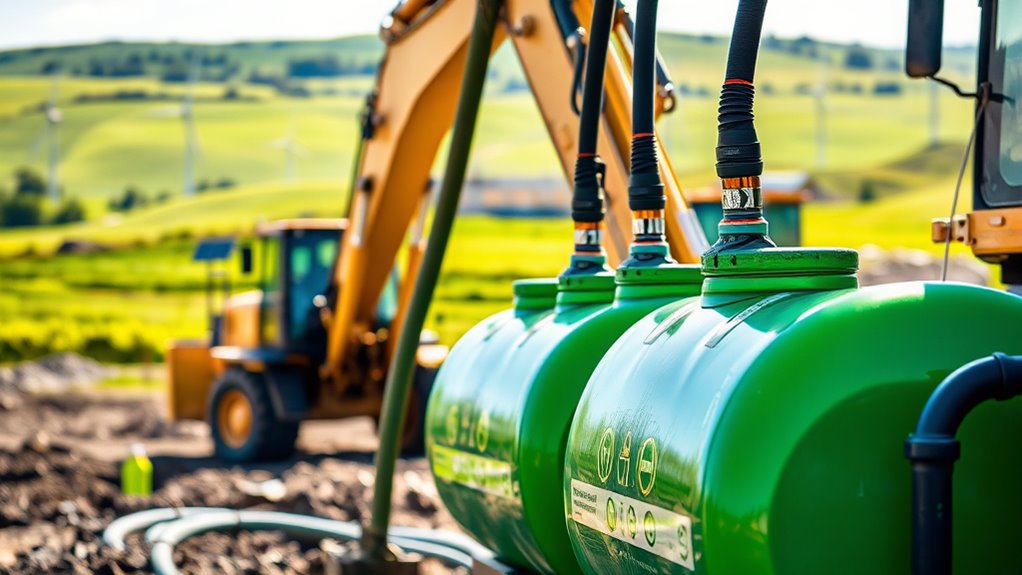
Renewable diesel offers significant emissions reduction benefits, making it a cleaner choice for heavy equipment. It also works seamlessly with existing engines, so you won’t need costly modifications. This combination helps you lower your environmental footprint without sacrificing performance. Additionally, the use of renewable fuels can contribute to more sustainable off-road operations.
Emissions Reduction Benefits
Because it produces fewer pollutants than traditional diesel, renewable diesel markedly reduces emissions from heavy equipment. Switching to renewable diesel can considerably lower greenhouse gases and harmful particulates released into the environment. Here are some key benefits:
- Reduces CO₂ emissions by up to 65%, helping combat climate change.
- Cuts particulate matter and soot, improving air quality around work sites.
- Lowers nitrogen oxides (NOx) emissions, which contribute to smog formation.
- Decreases sulfur content, reducing sulfur oxide emissions that cause acid rain.
These reductions not only protect the environment but also improve local air quality, creating healthier conditions for workers and nearby communities. Using renewable diesel makes your operations cleaner, aligning with sustainability goals and regulatory standards.
Compatibility With Engines
Switching to renewable diesel not only offers significant environmental benefits but also demands compatibility with your heavy equipment’s engines. Most modern engines can run renewable diesel without modifications, as it’s chemically similar to petroleum diesel. However, it’s essential to verify manufacturer guidelines, as some older engines may need adjustments or specific fuel filters to prevent clogging. Renewable diesel’s high cetane number improves combustion, but it can cause issues like injector fouling if not properly compatible. Regular testing and consultation with engine manufacturers help ensure seamless integration. By confirming compatibility upfront, you reduce the risk of operational disruptions and extend your equipment’s lifespan. Overall, renewable diesel can be a reliable, cleaner alternative when your engines are compatible and properly maintained.
Electric Power for Off-Highway Applications
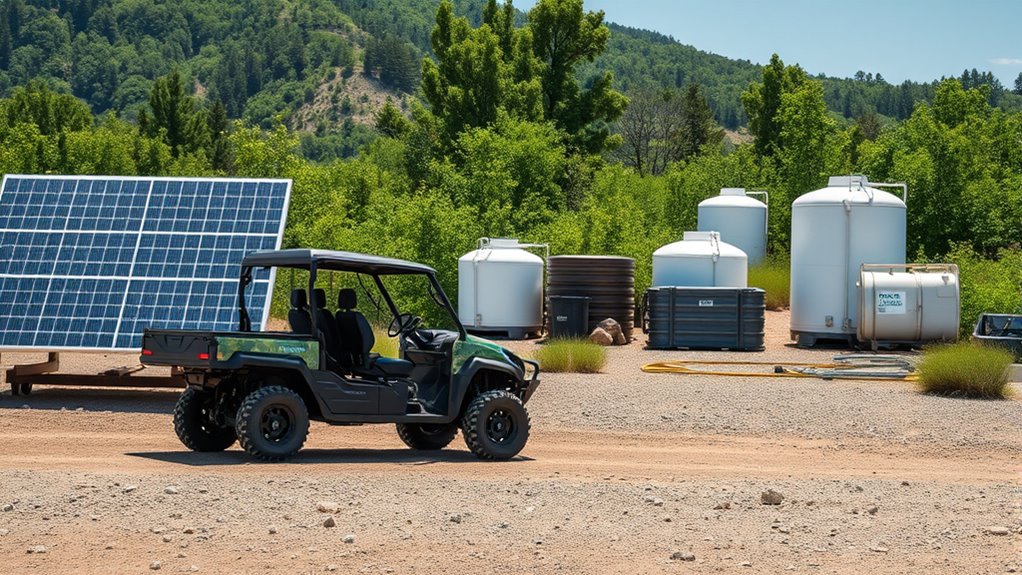
Electric power is increasingly becoming a viable option for off-highway applications, offering a cleaner and more efficient alternative to traditional fuels. As technology advances, electric equipment delivers benefits like reduced emissions, lower operating costs, and quieter operation. You can expect quicker startup times and smoother performance with electric motors. Additionally, infrastructure improvements are making charging more accessible on-site. Here are some key advantages:
Electric power offers cleaner, quieter operation, lower costs, and faster startup for off-highway equipment.
- Zero emissions during operation, improving environmental impact.
- Lower maintenance due to fewer moving parts.
- Instant torque delivery for better productivity.
- Potential for integrating renewable energy sources for charging.
Embracing electric power helps you meet stricter regulations while boosting efficiency and sustainability in your operations.
Hydrogen Fuel Cells in Off-Road Engines
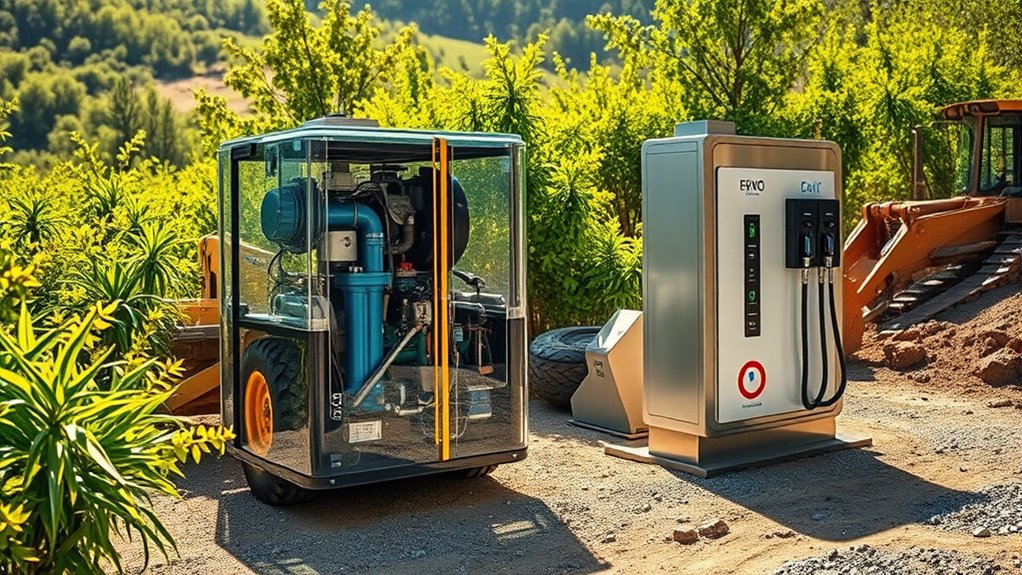
Hydrogen fuel cells offer impressive efficiency for off-road engines, turning hydrogen into electricity with minimal waste. They also considerably cut emissions compared to traditional fuels, helping you meet strict environmental standards. Exploring these benefits can show you how hydrogen can play a key role in sustainable off-road operations.
Hydrogen Fuel Efficiency
Despite the challenges, hydrogen fuel cells offer a promising solution for enhancing efficiency in off-road engines. They convert hydrogen directly into electricity, providing a clean and reliable power source. To maximize fuel efficiency, consider these key factors:
- Optimized Fuel Storage: Using lightweight, high-capacity tanks minimizes energy loss during storage and refueling.
- Advanced Power Management: Implementing smart systems ensures the engine uses hydrogen efficiently, reducing waste.
- Regular Maintenance: Keeping fuel cells in top condition prevents performance drops and maintains efficiency.
- Operational Strategies: Adjusting engine load and speed based on task can markedly conserve hydrogen fuel.
Emission Reduction Benefits
Implementing hydrogen fuel cells in off-road engines considerably reduces harmful emissions compared to traditional fossil fuel systems. When you switch to hydrogen fuel cells, you’ll eliminate emissions of nitrogen oxides (NOx), particulate matter, and carbon monoxide, which contribute to air pollution and health issues. Hydrogen fuel cells produce only water vapor as a byproduct, making them a clean alternative. This shift can profoundly improve air quality in your work environment and reduce your carbon footprint. Additionally, reducing harmful emissions supports compliance with stricter environmental regulations. By adopting hydrogen fuel cell technology, you not only lower your engine’s environmental impact but also set a sustainable example for the industry. Overall, hydrogen fuel cells offer a meaningful way to achieve cleaner, greener off-road operations. Incorporating attention in creative practice can help optimize the implementation of new technologies and solutions.
Comparing Sustainability: Conventional vs. Alternative Fuels
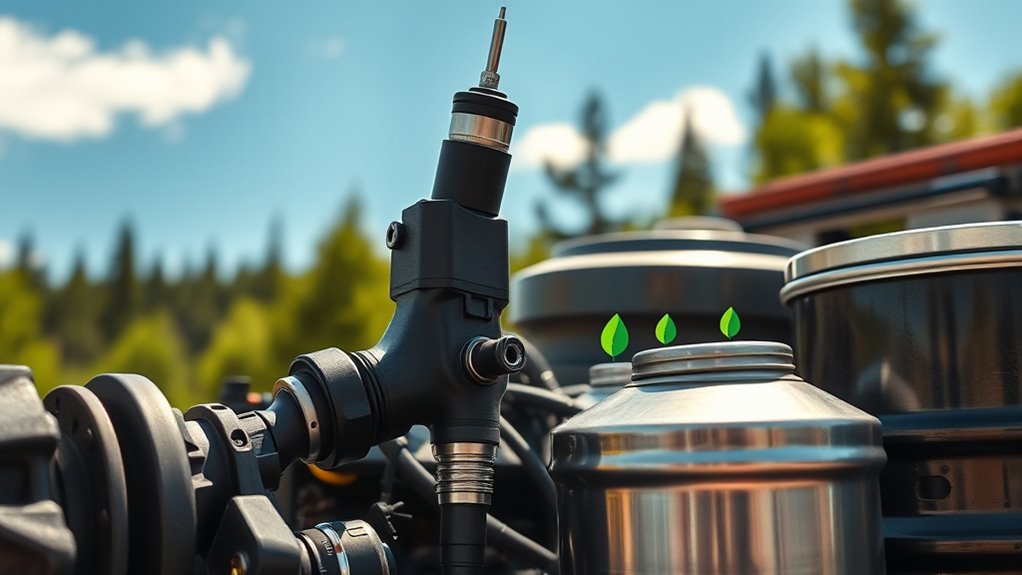
When evaluating the sustainability of off-road fuels, it’s important to compare conventional options like diesel and gasoline with alternative fuels such as biodiesel, ethanol, and electricity. Conventional fuels are well-established but contribute markedly to greenhouse gases and pollution. Alternative fuels tend to be cleaner and more renewable, but they vary in impact and availability. Consider these points:
Evaluating off-road fuel sustainability involves balancing emissions, renewability, and environmental impact.
- Carbon footprint: Alternatives often produce fewer emissions during combustion.
- Renewability: Bio-based fuels are renewable, whereas fossil fuels are finite.
- Energy balance: Some alternatives require less energy to produce, making them more efficient.
- Environmental impact: Alternatives can reduce pollution and habitat disruption, but production methods matter. Exploring caffeine content in espresso can illustrate how energy consumption varies with different brewing methods, impacting overall environmental footprint.
Choosing the right fuel depends on balancing these factors to maximize sustainability.
Infrastructure and Adoption Challenges for Green Fuels
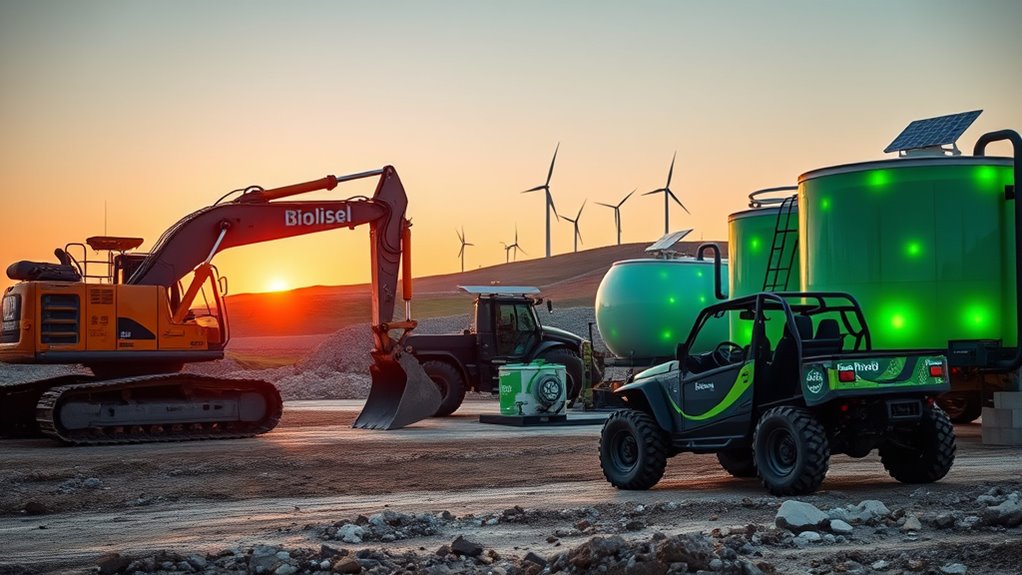
Adopting green fuels for off-road engines faces significant hurdles rooted in infrastructure and market readiness. Many regions lack the refueling stations and logistics needed to support alternative fuels like biofuels or hydrogen. Moving on to juice cleansing requires substantial investment to build or upgrade infrastructure, which many companies hesitate to undertake without proven demand. Additionally, the current supply chain for green fuels is limited, making widespread adoption difficult. Market acceptance also poses a challenge; operators may resist switching due to uncertainty about fuel availability, performance, or long-term costs. Regulatory frameworks are evolving but may lag behind technological advancements, adding further delay. Without coordinated efforts to develop infrastructure and incentivize adoption, changing to sustainable fuels remains a slow and complex process.
Economic Benefits of Transitioning to Sustainable Off-Road Fuels

Switching to sustainable off-road fuels offers significant economic advantages that can benefit operators and industries alike. First, you can reduce fuel costs over time, especially as renewable options become more affordable. Second, progressing minimizes maintenance expenses by decreasing engine wear and corrosion caused by traditional fuels. Third, you’ll likely face fewer regulatory penalties or taxes linked to emissions, saving money in compliance. Finally, adopting green fuels can enhance your company’s reputation, attracting environmentally conscious clients and partners. These benefits not only lower operational expenses but also position you as a leader in sustainability, opening doors to new markets and incentives. Embracing sustainable fuels today makes economic sense, ensuring long-term profitability and resilience in your industry. Incorporating cost-effective renewable fuels can further improve your bottom line by reducing dependency on fluctuating fossil fuel prices.
Future Trends and Innovations in Off-Road Fuel Technologies

As research advances, innovative off-road fuel technologies are poised to transform the industry by enhancing efficiency, reducing emissions, and expanding sustainable options. Expect to see increased adoption of biofuels, such as advanced ethanol and biodiesel blends, which offer better compatibility and performance. Hydrogen fuel cells are also gaining traction, promising near-zero emissions and high energy density for heavy machinery. Battery-electric solutions are evolving rapidly, enabling quieter, cleaner operations with lower operating costs. Future trends include smarter fuel delivery systems that optimize combustion and reduce waste, as well as hybrid technologies combining multiple fuel sources for versatility. These innovations will help you meet stricter regulations while improving sustainability, ultimately shaping a cleaner, more efficient off-road industry. Additionally, advancements in renewable energy integration can further improve the sustainability of off-road operations by utilizing clean energy sources for powering equipment.
Frequently Asked Questions
What Are the Safety Considerations for Handling Alternative Off-Road Fuels?
Handling alternative off-road fuels requires careful attention to safety. You should always wear proper protective gear, such as gloves and goggles, and manage fuels in well-ventilated areas to prevent buildup of fumes. Avoid open flames or sparks, and store fuels in approved containers away from heat sources. Regularly check for leaks or spills, and follow manufacturer guidelines. Staying alert and cautious guarantees your safety when working with these alternative fuels.
How Do Lifecycle Emissions Compare Among Different Sustainable Fuels?
You want to understand how lifecycle emissions differ among sustainable fuels. Typically, biofuels like ethanol and biodiesel produce lower emissions during use, but their production can involve significant land use and energy inputs. Electric off-road engines, especially when charged with renewable energy, have minimal lifecycle emissions. Overall, renewable electricity and advanced biofuels tend to offer the best balance, reducing total emissions across their entire lifecycle.
Are There Government Incentives for Adopting Green Off-Road Fuel Options?
You’ll find that many governments offer incentives for adopting green off-road fuel options. These can include tax credits, grants, and rebates aimed at reducing emissions and encouraging sustainable practices. Check your local or national programs, as incentives vary by region and fuel type. Taking advantage of these incentives can lower your costs and help you contribute to environmental preservation, making it easier and more affordable to switch to greener fuels.
What Is the Longevity and Maintenance Impact of Using Renewable Fuels?
You want to know about the longevity and maintenance impact of renewable fuels. Using these fuels can extend engine life since they burn cleaner, reducing wear and tear. However, they may require specific maintenance, like filter changes or fuel system checks, due to different chemical compositions. Overall, renewable fuels can be cost-effective long-term, but you’ll need to stay attentive to manufacturer guidelines to optimize engine performance and durability.
How Do Storage Requirements Differ for Various Alternative Fuels?
Oh, sure, storing alternative fuels is just like stashing snacks—you think any container will do. In reality, each fuel demands specific storage conditions: ethanol needs airtight tanks to prevent evaporation, biodiesel requires moisture control, and hydrogen needs high-pressure tanks for safety. You can’t just throw them in the garage and hope for the best. Proper storage is essential to avoid hazards, contamination, and fuel degradation.
Conclusion
As you explore sustainable fuel options, remember that like Icarus reaching for the sun, aiming too high without caution can lead to setbacks. Embracing these innovations now sets you on a path toward a greener future, where off-road engines run cleaner and smarter. By balancing ambition with practicality, you can help craft a world where technology and nature soar together, forging a legacy as enduring as the myths that inspire us.
